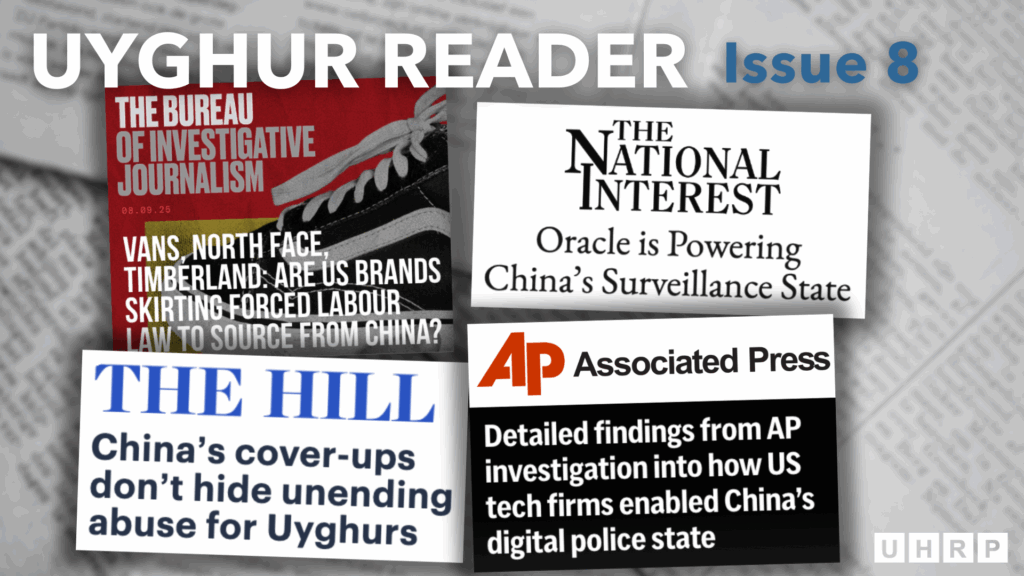The Uyghur Reader: Stories We’re Following (Issue 8)

Issue 8: September 4 – September 17, 2025
Welcome to the eighth issue of the Uyghur Reader, a biweekly content roundup curated by the staff of the Uyghur Human Rights Project.
Each issue features carefully selected articles, reports, and publications from media outlets, academic institutions, NGOs, and government sources. While we highlight urgent human rights issues, we also aim to reflect the breadth of the Uyghur experience, including politics, economics, history, and culture.
This week’s selections come from Associate Director for Research and Advocacy Peter Irwin, Chinese Outreach Coordinator Zubayra Shamseden, Director of Global Advocacy Louisa Greve, and Director of Research Henryk Szadziewski.
📌 An Associated Press investigation by Dake Kang and Yael Grauer reveals that U.S. technology companies played a central role in building China’s surveillance state, selling billions of dollars’ worth of hardware and software to Chinese police, military, and surveillance firms. Leaked documents, corporate records, and interviews show how companies including IBM, Dell, Intel, Microsoft, Nvidia, Thermo Fisher, and others provided tools later used in the repression of Uyghurs and Tibetans, including predictive policing platforms, DNA kits, and AI-powered cameras and mapping systems that restrict Uyghur movement. The findings highlight how American firms, alongside European and Asian suppliers, became foundational to the technologies behind mass surveillance and ethnic repression in China. “American Tech Companies Enabled China’s Surveillance State,” September 9.
📌 Writing in The Hill, Yalkun Uluyol, China researcher at Human Rights Watch, recounts the personal cost of China’s mass detention campaign, including the imprisonment of his father, Memet Yaqup, who is serving a 16-year sentence. Uluyol describes the silence forced upon Uyghur families, Beijing’s propaganda tours, and the use of transnational repression to intimidate those abroad. He urges the U.N. and governments to press for accountability and renew calls to release those arbitrarily detained. “China’s cover-ups don’t hide unending abuse for Uyghurs,” September 5. Read in Chinese/中文.
📌 Building on reporting we highlighted in our last issue about NBA-linked brands tied to forced labor, Daniel Murphy, writing for The Bureau of Investigative Journalism, details how Uyghur, Kazakh, and Kyrgyz workers are coerced into footwear factories in Jinjiang, a hub that produces one in five pairs of trainers worldwide. Brands including Skechers, Guess, and Tommy Hilfiger source from factories linked to state labor transfer programs, while Taiwan’s Fulgent Sun Group has shifted supply chains from China to Vietnam to continue producing for Vans, The North Face, and Timberland. The investigation shows how companies may be skirting laws like the UFLPA, keeping forced labor-tainted products in global markets. “China’s Economy Runs on Uyghur Forced Labour,” September 8.
📌 In The National Interest, Luke Hogg provides a rundown of Oracle’s contracts providing the “backbone” of official IT systems in the agencies running China’s surveillance state, and powering repression in the Uyghur Region. Oracle’s extensive operations in China raise urgent questions. How can an American company enable repression abroad while simultaneously working directly with the US government? Policymakers must confront this contradiction, guided by a simple principle: US companies should not be complicit in foreign oppression while receiving American taxpayer support. “Oracle is Powering China’s Surveillance State,” September 4.
📌 The fanghuiju (Becoming Family) campaign has become a central tool of control over Uyghur lives, writes Stefanie Kam in a research article for The China Quarterly. Once modeled on Mao-era mobilization, it has now evolved into a permanent system where local officials and cadres embed themselves in Uyghur communities to monitor daily life, collect personal data, and push state ideology. By combining old-style political campaigns with today’s surveillance technology, these work teams function as instruments of surveillance, indoctrination, and social restructuring in Uyghur society. “The Evolution of Grassroots Governance in China: Home Visits by Work Teams in Xinjiang,” September 4. Read the PDF.
Keep reading:
- Steve Prokopy, Third Coast Review, September 8: Interview: Filmmaker Bing Liu on Preparation for the Next Life, Casting a Uyghur Lead Actor, and Telling Immigration Stories
- Arslan Hidayat and Nuriman Abdureshid, Kashgar Times, September 4: The Uyghurs of China’s Military Parade
- Radio Free Asia, September 4: U.S. House passes Uyghur Policy Act supporting victims of persecution by China
- Nina Larson, AFP, September 9: Rights Advocates Demand UN Press China On Abuses In Xinjiang
- U.S. Committee for Refugees and Immigrants, September 3: Made in China: Forced Labor and the Uyghur People
